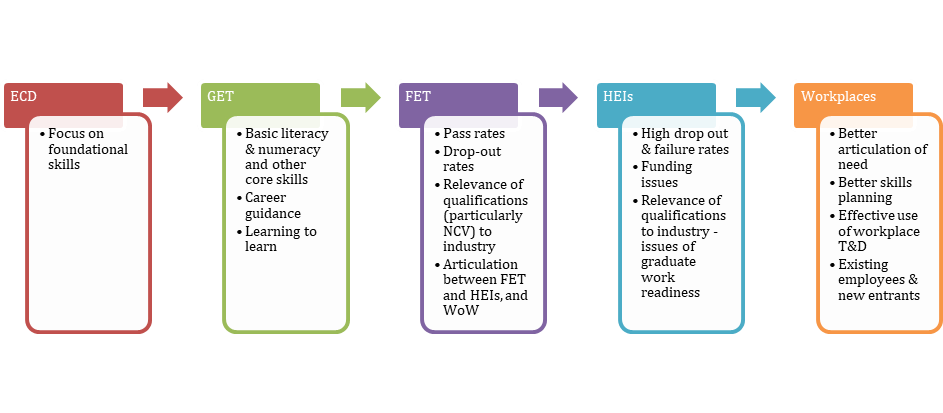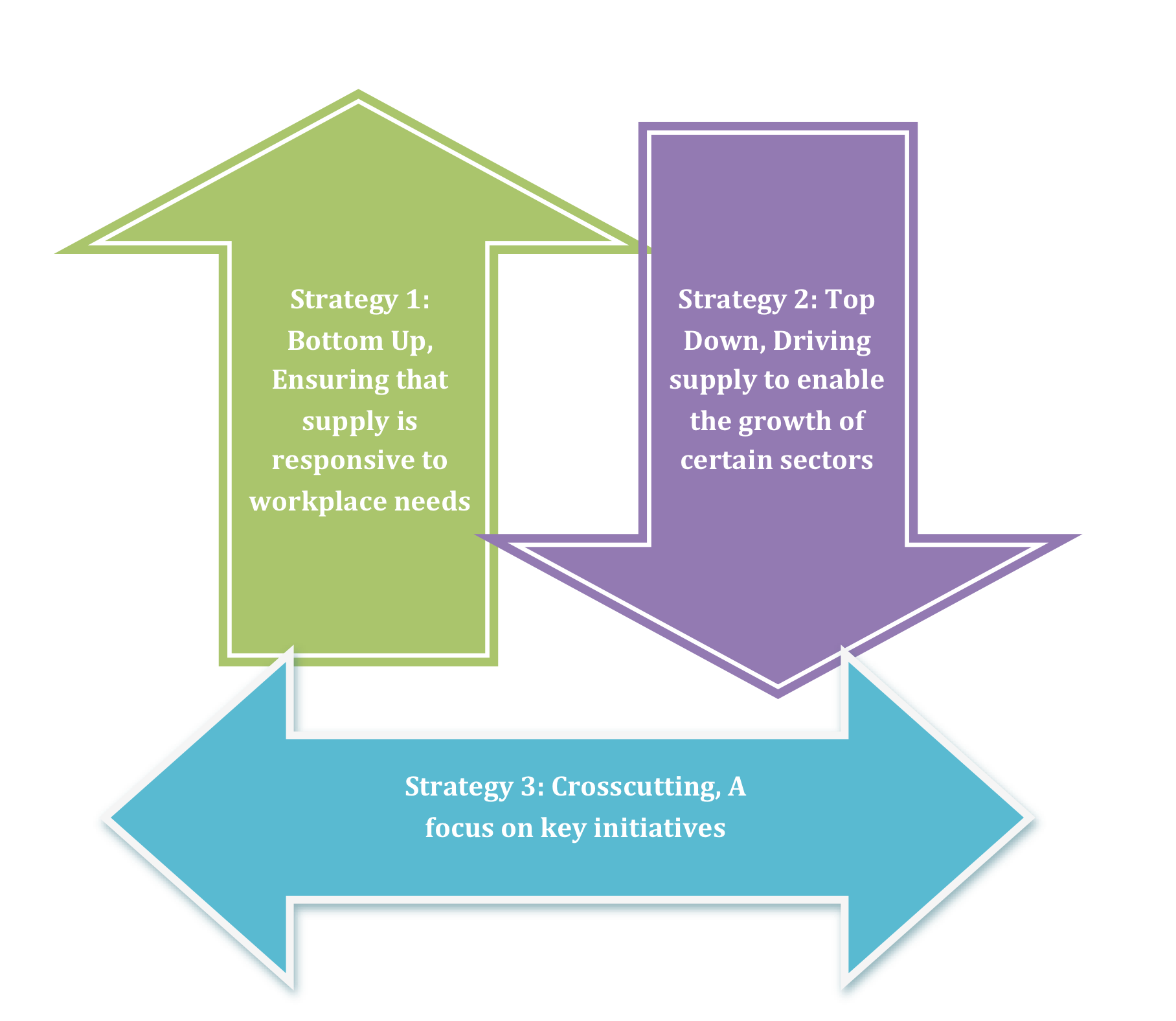Provincial Skills and Partnerships
(Western Cape Government)
Provincial Skills and Partnerships (PSP)
The key role of the Provincial Skills Partnerships sub-programme is the coordination of skills development which facilitates a shift of the imbalance and mismatches between the current shortage of high-level skills required by a competitive global economy and large supply of low-level skills. Overcoming this imbalance will directly increase economic growth and reduce poverty.
The focus of the PSP is on the key economic growth areas, increasing access to economic activities, innovation capacity, benchmarking, improving and updating education and training outcomes and facilitating skills development along the Skills Pipeline for all levels of the human resource development and management value chain - entry, development, retention, and exit.
The Skills Pipeline

The PSP unit works with the Provincial Skills Framework for the Western Cape Provincial Government, which has a three prong Strategy, namely:

Strategy One: Ensuring that supply is responsive to workplace needs
-
Pro-active approach to firm support on the demand-side and suggests the importance of working with employers to reshape their demand for skills.
-
In this “bottom up” approach the focus is on ensuring that role players are able to indicate their current shortages, and any anticipated shortages, as well as indicate any obstacles that they are experiencing in implementing occupational programmes.
-
The lens that will be utilised to undertake this analysis will be the skills pipeline – to ensure that the supply is able to address demand and that there is a sufficient pool of individuals with the relevant skills, knowledge and attitudes to enter the workplace, and to improve levels of productivity within the workplace.
Strategy Two: Driving supply to enable the growth of certain sectors
-
This approach relies on the proactive approach to ‘articulating’ demand that has been adopted within the Western Cape and then driving the skills to grow the sector.
-
Practically this suggests that the Western Cape government will focus on those economic sectors which it is actively driving and working with business, and will determine the skills that will be required to support the achievement of these economic imperatives in the medium to longer term. Existing business will also be encouraged to consider the implications of these developments for their own businesses and related skills needs
Strategy Three: A focus on key initiatives
-
WC will also support key initiatives intended to support supply/demand: some have already been identified and some may be through the work that is carried out in strategies one and two.
-
Those suggested already include:
- The improved sourcing and placement of matric and NCV graduates in a way that ensures that there is effective selection, assessment and matching
- Role players support learners at school to attain requisite mathematics and science
- Focus on ways to increase number of artisans and professionals trained and registered
- More effective implementation of RPL
- Attracting new talent by using migration policies as a means of solving skills gaps and labour shortages
- Support the utilization of a database (including current skills and demand.
- Intervention to support the development of individuals that can enable supply/demand planning
Key Initiatives Driven by PSP:
The Premier’s Council on Skills
The Premier Council on Skills (PCS), which is a consultative forum, chaired by the Premier, responsible for the co-ordination of skills on a political level, provide strategic leadership and provide a platform for strategic dialogue between social partners inclusive of business, labour, civil society and other related stakeholders within the province.
Latest PCS
5 August 2022
Energy Resilience in the Solar Photovoltaic (PV) Industry
Download the PCS Report HERE
Premier Alan Winde hosted the Premier’s Council on Skills on 5 August 2022 at the Lagoon Beach Hotel, Milnerton. To support energy resource efficiency and sustainability to improve the competitiveness and resilience of the whole economy, the engagement platform focused on collaborating and driving skills development to support Solar Energy and address skills needs in the Green Economy.
The PCS was an opportunity to link the launch of the first (1st) of its kind Solar Photovaltaic Technician Qualification and the Solar Energy Training Centre at the public TVET college, West Coast College funded by the merSETA, in partnership with the South African Renewable Energy Training and Education Centre (SARETEC), and the Department of Economic Development and Tourism (DEDAT). This formed part of a national drive to support the establishment of such centres to pilot the new Solar Photovoltaic (PV) Technician qualification and address future skills offerings to support skills for the green mobility, renewable energy manufacturing, repair and service of equipment sectors within the Green Economy.
The Solar Photovoltaic Technician Qualification promotes and encourages the dual vocational methodology that are demand-led and shaped by industry needs aligned to key growth sector. It has also allowed for collective engagement between industry, SETAs, and skills supply providers to identify current and future skills gaps required within the Solar Energy industry and the broader Green Economy to shape future skills offerings to address skills gaps.
Presentations made at the Premiers Council on Skills:
Annexure 1 – Presentation by Dr. Rethabile Melamu from SAPVIA
Annexure 2 – Presentation by Mr. Bernhard Teuteberg from DEDAT
Annexure 3 – Presentation by Mr. Melville Healing from SARETEC
Annexure 4 – Presentation by Mr. Gerhard Coetzee from West Coast College
Previous PCS
Business and Education Meets: 28 October 2021
Presentations: WCED I Nic Spaull I PCS Report
Virtual Premier Council on Skills: 16 April 2021 Theme: The Future of Work Place Training in a Post-COVID-19 World
Premier’s Council on Skills: 11 September 2019: Theme: Advancing Skills for the Digital Economy
The Department of Economic Development and Tourism has set for itself the goal for the Western Cape to be positioned as a leading global digital hub and tech talent hub of Africa.
The Western Cape Provincial Government recognizes that the Fourth Industrial Revolution (4IR) will bring significant changes to the way we live, interact and do business. 4IR brings with it great promises but also great perils, if not proactively dealt with in through holistic, sustained and concerted efforts.
To this end, the Skills development and Digital Economy units within DEDAT have been jointly pursuing an initiative known as #SkillsBoostWesternCape with the aim of developing a shared digital skills agenda for action in the Western Cape.
The WCG adopted the Provincial Broadband Strategic Framework in 2012, championing the importance of a connected and digitally inclusive provincial economy and this then culminated in a number of important investments by the WCG, most notably the commitment to a 10-year, R3bn contract to connect almost 2000 WCG sites to high speed internet to improve services delivery efficiency and also commitment to all WCG buildings having public access Wi-Fi where all citizens can access 3GB (three gigabytes) of free data per month.
As the enabling infrastructure comes into place, the focus has expanded to include the participation of citizens and businesses in a digital connected economy. Importantly, with the nature of work changing, affected by digital disruption and 4IR, some jobs will be displaced, and new roles will emerge.
As a provincial government, our best defence will be to maintain and grow jobs is to equip people with the skills relevant for human-machine collaboration. Our education and training systems need to adapt to better prepare people for the flexibility and critical thinking skills they will need in the future workplace.
#SkillsBoostWC recognises that government cannot address and harness the digital transformation of the economy on its own. It will be through collective efforts of government (provincial, national and local), private sector, civil society, education and academia working collaboratively.
-
Premier's Council on Skills: 19 March 2019. Theme: " Apprenticeship"
-
Premier's Council on Skills: 30 May 2017. Theme: " The Western Cape is open for business"
-
Premier's Council on Skills: 30 September 2014. Theme: Skills Development in the West Coast region.
-
Premier's Council on Skills: 18 September 2013. Theme: Design
-
Premier's Council on Skills: 17 July 2012. Theme: Potential areas of economic growth in the Western Cape
Skills Intelligence Reports
During the Financial Year 2020/2021 the PSP team compiled 4 Skills Intelligence reports that focused on various topics:
Quarter 1: Impact of COVID-19 on Education and Training
Quarter 2: Digital Transformation in the Western Cape
Quarter 3: Youth Not in Education, Employment or Training (NEETs)
Quarter 4: Skills Demand and Supply
The Skills Intelligence Report will be both a practical and strategic demonstration of facilitative engagements across the skills pipeline within the Western Cape, to drive integrated planning towards the alignment between the supply of and demand for skills and, critically, to drive Skills Development so that it can play a role in supporting and enabling economic growth in the Province.
The Skills Intelligence Report will encompass a high-level overview of the Education and Training landscape to understand the role of the various stakeholders, which includes the three (3) Government spheres and Industry, that support the skills ecosystem. Market intelligence will be outlined to indicate the supply of skills in the Province to align with to the jobs and skills demands required by Priority Sectors, that drive Economy.
Data drawn from stakeholder engagements and market intelligence, will be processed; findings analysed; and a concrete set of recommendation on addressing skills challenges in the Western Cape will be presented. The Skills Intelligence Report and its recommendations will be grounded both in a practical understanding of the Western Cape’s skills needs; priorities; the production; and use of market intelligence for skills planning.
Targeted Initiatives
College SETA Forums
This forum is a collaboration between DHET’s various branches (TVET Colleges, Sector Education and Training Authorities (SETA), Community Education and Training College (CETC), National Skills Fund (NSF), National Skills Authority (NSA), Higher Education Institutions (HEI) and Quality Council on Trades and Occupations (QCTO)) and DHET.
The aim is to drive skills development through a coordinated and innovative approach to enable economic growth in the province.
Contact:
Melissa Parker
Director: Provincial Skills and Partnerships
T: (021) 483 9429 E: Melissa.Parker@westerncape.gov.za


